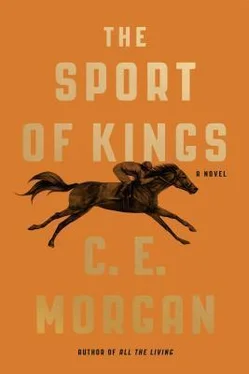Are you awake, Henrietta? When you lie so still like that, it’s as if you’re dead and if you’re dead, then I’m dead too, because you are the very pupil of my eye. Are you listening?
Yes, Father. I’m awake. I’m always listening.
* * *
“All I want is a little pleasure.”
Pleasure: a sensation of enjoyment, satisfaction; the indulgence of appetite; sometimes personified as a female divinity. Considered by most to be the opposite of pain.
What was there to do for pleasure on a Sunday in Paris, Kentucky, 1983? The only thing that didn’t drive Judith completely and utterly insane was to spend a quiet hour in the Paris Cemetery. The space reminded her — granted, in peacefulness only — of the Tuileries and the Jardin des Plantes, which she had enjoyed when she was pregnant with a teenager’s hope and limitless expectation but not yet pregnant with Henry Forge’s child. She had at first tried to take Henrietta to the park in the center of town, but the girl was relentless, pressing endlessly for a push on the swing — One more push! One more! Mother! — then Watch!Watch!Watch! — so Judith couldn’t read the real estate section of the Times , and she was forever stubbing out fresh cigarettes to attend to the girl, who made a mess, an absolute, irredeemable mess of her own clothes and her mother’s sanity. What she was coming to realize, but what no woman was allowed to utter aloud, was that there was no guarantee your child would be adequate compensation for the life you gave up to have it. More and more, life looked an awful lot like a hoax perpetrated on women and designed to further men’s lives at the expense of their own.
“All I want is a little pleasure.”
What did Henrietta know or care about any of this? She had plenty of pleasures, such as the cemetery’s Gothic chalk gates, white as the Cliffs of Dover, through which broughams and phaetons once rattled under the old sign: It is appointed unto men once to die, but after this the judgment. When her mother stopped their Mercedes to light her first cigarette of the hour, Henrietta — free, unmolested, wild — would run out among the graves to trample on the dead, skipping over their complaints and concerns, their dreamy chatter and arguments of confinement, their hate bred by close quarters, not so different perhaps from her parents’ ferocious arguments, which she heard when she was tucked in her bed at home. The dead had nothing to break or slam except their dull coffin lids. Her mother had the dishes of life and the doors of happenstance. And a voice for shattering windowpanes.
“Jesus,” Judith said, “this place is just unspeakably boring. It simply defies words.” A great, trembling ash broke free from her long cigarette and floated alongside the car.
Henrietta looked about in confusion. “The cemetery?”
“Everything, Henrietta. Every last thing.”
“Mother, why do you smoke?”
“It keeps my weight down,” Judith said distractedly. “I mean, please explain to me how I ended up here. I lived in Paris, honey, the real Paris. The only Paris. Sometimes I can’t believe I bought Henry’s pack of lies and … traded Paris and Deauville for this.” She shook her head and lowered her chin. “Just promise me that when you grow up, you’ll know exactly what you’re choosing between when you make your choices. Men like naïve girls, and there’s a reason for that.”
Henrietta gazed up at her mother’s delicate profile. “Can I have brothers?”
Judith’s finely sculpted head snapped round, her brilliant eyes nearly sewn shut. “Did your father tell you to say that to me? Did he put you up to that?” she said.
“No—”
“God, I can’t stand men. It’s always all about them. They’ll even use their children to further their own ends.”
“Daddy says—”
“Go play, Henrietta! Please! Just give me a few minutes of quiet.”
Yes, go play among the graves, turn cartwheels over those tucked into their grass bedding, snatch at any excitements they left behind. Find the sloping declivity with Lavinia’s cenotaph, under which she lies with dusty eyes closed, hands folded on her cancerous breasts. What pleasures she once flung away in her dying, Henrietta, take up now in your mouth.
The time-tattered granary loomed across the road.
When she approached birds, they all fled heavenward.
Chips of cloud formed scissors. They threatened to cut every thread in the world.
In joyful horror, Henrietta grasped up a single flower and raced back to the car. Her mother sat resting with her chin on her hand, her elbow on the window chrome. Her face had regained its equilibrium, but as the girl approached, her brow drew tight.
“Henrietta — have you been lying in the grass?”
The girl slowed, her mood suddenly veiled, her lips pressed together so tight they puffed out, showing a faint belligerence.
“Have you been lying in the grass?” This time the voice was not so sharp, but it seemed to shake with a strange and mysterious grievance, which the girl sensed but could not understand. “I’m not interested in putting you in a new dress every hour of the day. Why do you always do that?” And then turning to the windshield and saying to no one: “Why does she always do that…?”
Henrietta said, “I brought something for you.” She held out a yellow carnation, soft as a horse’s muzzle, its edges already curling and tea-stained with decay.
“Henrietta,” Judith admonished, “did you steal this from a grave?” but she reached out and gently lifted the flower from her hand.
“No.”
Her mother couldn’t help it, she smiled. “Get in the car,” she said, and her daughter came round dutifully and slid in beside her.
“Grandmother says hi,” Henrietta said as she struggled with her seat belt.
Judith reared back slightly. “Don’t say things like that,” she said. “It’s creepy.”
“Okay,” said the girl. Then she said, “Did you know that if there were only two elephants in the world and they mated, in five hundred years there would be fifteen million elephants?”
“You’re only seven,” said Judith. “Why do you know anything about mating?”
“Daddy told me. Mother, what if you had to spend your whole life being chained to a tombstone, and you couldn’t get anybody to unlock your chain?”
“My God, Henrietta, what awful things you think of,” said Judith, the delicate plane of her brow wrinkled up in distaste.
“Probably nobody would want to be around you, and wild dogs would come and try to eat you.”
“Well,” said Judith, starting the car and remaining attentive only by an anemic and diminishing force of will, “maybe you could train the dogs and name them and then they might leave you alone.”
“Wild dogs don’t have names, silly!” Henrietta cried, and she laughed uproariously, and her mother just bent her head slightly away from the sound of that shrill and disruptive laughter, a sound she herself could not remember ever having made.
* * *
But their horses did have names. In the early spring of each year, Henry led his daughter out to a pasture at the rim of the bowl, where three or four mares were turned out with shiny new foals — copper and bay and a dappled gray almost white. Unlike their dark and calm dams, they sprang about, bouncing here and there and spending their small energies. They were comically, even absurdly, composed with root beer barrel knees and cannons thin enough to snap over a grown man’s thigh. Their eyes, like their legs, were set awkwardly wide, their tails as short and bushy as the tails of rabbits.
Henrietta was reading by her fourth year, and by the time she was eight, she was attendant to the namings, standing beside her father with a stenographer’s notebook and a pencil, marking down his choices like a small actuary. She balanced her book on the second plank of the fence while Henry rested a loafered foot on the first, his freckled forearms crossed on the top plank, as he gazed out over the dams and foals. Casuistry passed near, her foal peering curiously around her, its head already framed by a halter, though it was merely days old.
Читать дальше
Конец ознакомительного отрывка
Купить книгу












